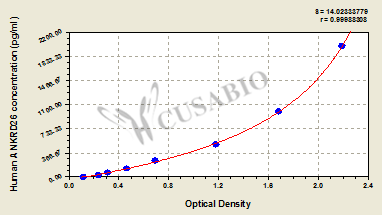Call us
301-363-4651 (Available 9 a.m. to 5 p.m. CST from Monday to Friday)
| Code | CSB-EL001763HU |
| Size | 96T,5×96T,10×96T |
| Price | Request a Quote or Start an on-line Chat |
| Trial Size |
24T ELISA Kit Trial Size (Only USD$150/ kit) * The sample kit cost can be deducted from your subsequent orders of 96T full size kits of the same analyte at 1/5 per kit, until depleted in 6 months. Apply now |
| Intra-assay Precision (Precision within an assay): CV%<8% | |||||||
| Three samples of known concentration were tested twenty times on one plate to assess. | |||||||
| Inter-assay Precision (Precision between assays): CV%<10% | |||||||
| Three samples of known concentration were tested in twenty assays to assess. | |||||||
| To assess the linearity of the assay, samples were spiked with high concentrations of human ANKRD26 in various matrices and diluted with the Sample Diluent to produce samples with values within the dynamic range of the assay. | |||||||
| Sample | Serum(n=4) | ||||||
| 1:1 | Average % | 90 | |||||
| Range % | 87-93 | ||||||
| 1:2 | Average % | 102 | |||||
| Range % | 98-106 | ||||||
| 1:4 | Average % | 85 | |||||
| Range % | 80-91 | ||||||
| 1:8 | Average % | 104 | |||||
| Range % | 101-108 | ||||||
| The recovery of human ANKRD26 spiked to levels throughout the range of the assay in various matrices was evaluated. Samples were diluted prior to assay as directed in the Sample Preparation section. | |||||||
| Sample Type | Average % Recovery | Range | |||||
| Serum (n=5) | 99 | 95-103 | |||||
| EDTA plasma (n=4) | 86 | 83-89 | |||||
| These standard curves are provided for demonstration only. A standard curve should be generated for each set of samples assayed. | ||||||||||||||||||||||||||||||||||||||||||||||||||||||||||||||||||||||||

|
||||||||||||||||||||||||||||||||||||||||||||||||||||||||||||||||||||||||
This Human ANKRD26 ELISA Kit was designed for the quantitative measurement of Human ANKRD26 protein in serum, plasma, tissue homogenates, cell lysates. It is a Sandwich ELISA kit, its detection range is 31.25 pg/mL-2000 pg/mL and the sensitivity is 7.81 pg/mL.
There are currently no reviews for this product.